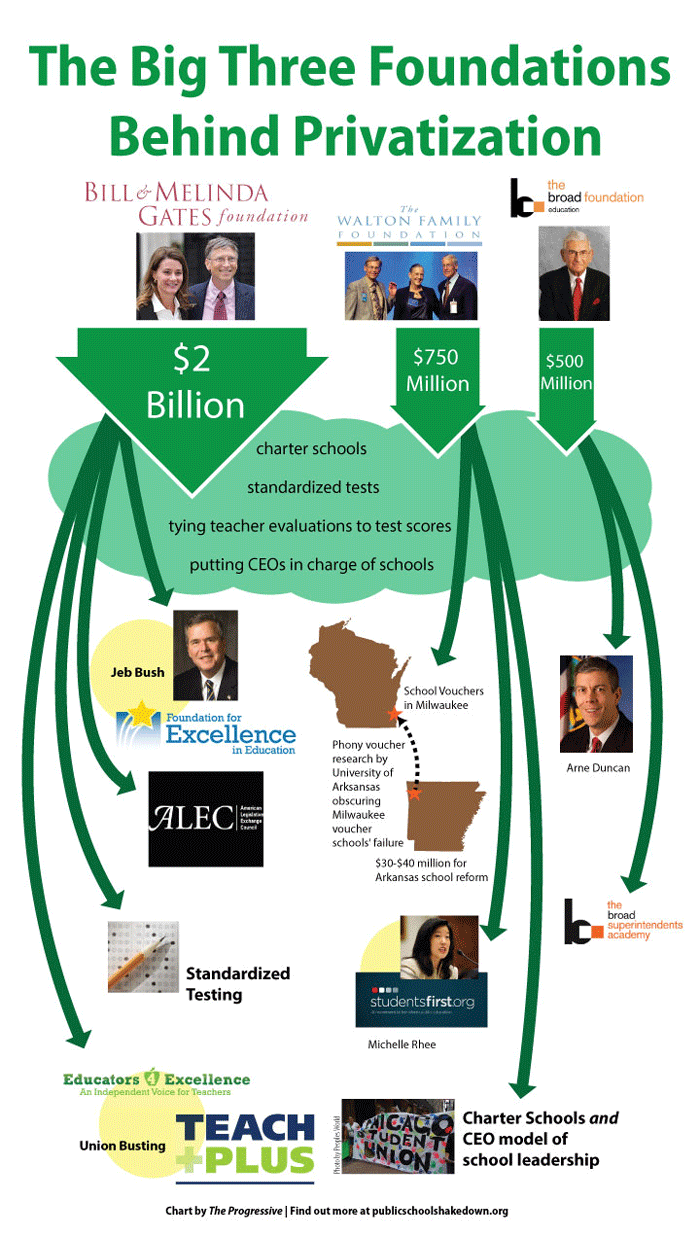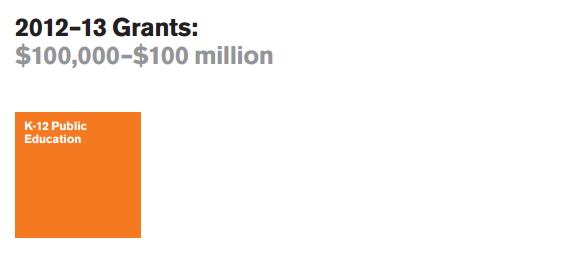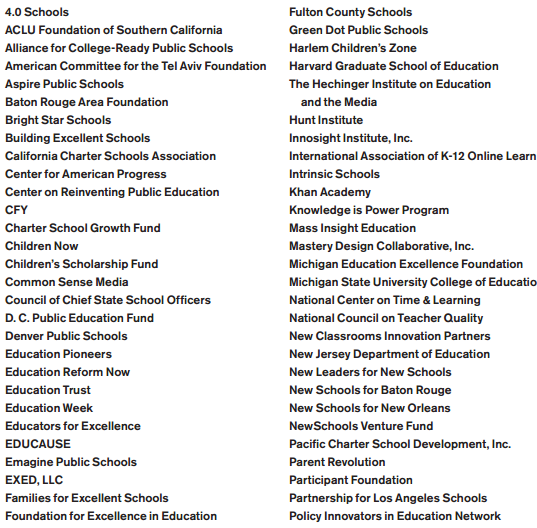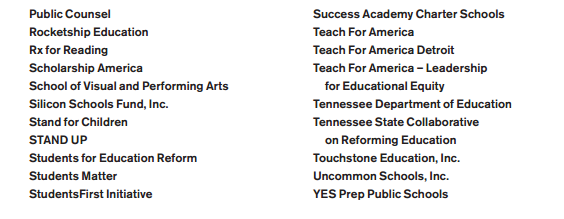Celebrating National Charter Schools Week: Dark Money Part 4 #CharterSchoolsWeek
Celebrating National Charter Schools Week: Re-Segregating America’s Schools Part 3 #CharterSchoolsWeek

The Gates Foundation, The Walton Foundation and the Broad Foundationcould easily be called the un-holy triad of the education reform complex.
While exact numbers are hard to pin down, since 2008 the Bill and Melinda Gates Foundation has spent at least $2 billion, the Walton Foundation at least three-quarters of a billion and the Broad Foundation an estimated half a billion dollars on efforts to “reform” America’s system of education by promoting charter schools, pushing the use of standardized testing, lobbying for teacher evaluation programs based on student’s standardized test results and other corporate-driven initiatives.
The foundations themselves explain their goals and funding strategies through innocuous rhetoric. For example, the Gates Foundation opines that: “We invest in programs with a common aim to strengthen the connection between teacher and student. To that end, we work with educators, policymakers, parents, and communities to expand and accelerate successful programs and identify innovative new solutions that can help unlock students’ potential.”
But the actual agenda becomes much clearer when one examines their actual list of grantees, which includes most of the country’s charter school management organizations, education reform “think tanks,” and advocacy organizations.
But the actual agenda becomes much clearer when one examines their actual list of grantees, which includes most of the country’s charter school management organizations, education reform “think tanks,” and advocacy organizations.
The Gates Foundation: “They’re Everywhere”
Education reform advocacy organizations that have received Gates money include Jeb Bush’s Foundation for Educational Excellence, Stand for Children, the Center for Reinventing Public Education and the Partnership for Learning and Parent Revolution. Gates has even supported the work of ALEC, the right-wing entity that helps conservative state legislators draft and pass legislation.
Education reform advocacy organizations that have received Gates money include Jeb Bush’s Foundation for Educational Excellence, Stand for Children, the Center for Reinventing Public Education and the Partnership for Learning and Parent Revolution. Gates has even supported the work of ALEC, the right-wing entity that helps conservative state legislators draft and pass legislation.
A primary focus of the Gates Foundation has been the push for the extensive use of high-stakes standardized testing. Although undisputed evidence shows that low standardized test scores are primarily driven by poverty, language barriers, and students’ special education requirements, the Gates Foundation, in its belief that data will solve all problems, has been spending hundreds of millions on developing teacher evaluation systems based on standardized tests, as well as the standardized tests themselves and the huge databases that would be needed to stores and analyze standardized test scores.
To counter the voices and concerns of teachers, the Gates Foundation has also played an essential role in creating pro-education reform teacher organizations includingEducators 4 Excellence and TeachPlus, both of which are dedicated to advocating against unions and teacher tenure and for specific teacher evaluation systems that rely on the use of standardized test scores. Both Educators for Excellence and TeachPlus were the recipients of significant start-up and operational funds from Gates.
The Gates Foundation is especially fond of funding “independent” think tanks that are involved in studying, reporting and developing education reform models.
The Walton Foundation: “The One Stop Education Reform entity”
If the funding isn’t coming from the Gates Foundation, it is probably coming from the Walton Foundation, the entity created and managed by the family that owns Wal-Mart.
By providing over $750 million in grants to education reform organizations over the last five years, not counting another $35-$40 million to actually pay for reforms in Arkansas, the Walton Foundation is the trendsetter when it comes to funding the development, analysis, advocacy and implementation of education reform.
If the funding isn’t coming from the Gates Foundation, it is probably coming from the Walton Foundation, the entity created and managed by the family that owns Wal-Mart.
By providing over $750 million in grants to education reform organizations over the last five years, not counting another $35-$40 million to actually pay for reforms in Arkansas, the Walton Foundation is the trendsetter when it comes to funding the development, analysis, advocacy and implementation of education reform.
In Milwaukee, for example, Walton funded the organizations that developed and pushed through the city’s school voucher program. But as a reporter for Gannett News Service discovered, the Walton Foundation also paid for the “external” study of the Milwaukee experiment. Not surprisingly the study, conducted by the School Choice Demonstration Project at the University of Arkansas, concluded that Milwaukee’s voucher experimenthad been a success in raising graduation rates among program participants. Left out of the study was the inconvenient fact that 56% of the students who enrolled in the voucher program left before graduating.
The Walton Foundation also underwrites a growing roster of organizations that focus their resources almost exclusively on advocacy efforts to “insert competition into public education.” One recent review found that just looking at funds dedicated exclusively to advocacy efforts, Walton money for “Advocacy" Exceeds $100 million.
Among the top recipients of Walton funds: StudentsFirst, the advocacy group started and run by controversial former Washington DC schools chancellor Michelle Rhee and Teach for America, which has received more than $50 million since 2011.
And while Advocacy has been a prime activity for the Walton Foundation, the organization has devoted the vast majority of its funds to the proliferation and expansion of charter schools.
Eli Broad Foundation: “Top-Down Education Reform”
And finally the last of the “Big Three” education reform funders is the Eli Broad Foundation which claims to be driven by the mission to, “dramatically improve K-12 urban public education through better governance, management, labor relations and competition.”
And finally the last of the “Big Three” education reform funders is the Eli Broad Foundation which claims to be driven by the mission to, “dramatically improve K-12 urban public education through better governance, management, labor relations and competition.”
Although the Broad Foundation hands out its fair share of money directly to education reform entities, the Foundation’s focus has primarily been to train a cadre of school administrators to go out and take over public school systems and force the reforms using top-down strategies.
The Broad Superintendents Academy and the Broad Residency in Urban Education are the two primary vehicles in that effort. The Broad Superintendents Academy is an executive management training program that takes “senior executives from business, nonprofit, military, government and education backgrounds to lead urban public school systems.”
The number of Broad Academy graduates in senior public school leadership positions has topped 200 including well over 70 superintendents who are working in more than half the states around the country.
The number of Broad Academy graduates in senior public school leadership positions has topped 200 including well over 70 superintendents who are working in more than half the states around the country.
Meanwhile, the Broad Residency program places education reformers in school districts and charter management organizations (CMOs). Broad Residents receive “two years of professional development,” although taxpayers often end up picking up the costs of salary and benefits for Broad Residents.
The Broad Academy and Broad Residency programs really took off with the election of President Barak Obama. As the Broad website coos:
“Prior to becoming U.S. secretary of education, Arne Duncan was CEO of Chicago Public Schools, where he hosted 23 Broad Residents. Duncan now has five Broad Residents and alumni working with him in the U.S. Department of Education.”
And, the web site adds, “The election of President Barack Obama and his appointment of Arne Duncan, former CEO of Chicago Public Schools, as the U.S. secretary of education, marked the pinnacle of hope for our work in education reform. In many ways, we feel the stars have finally aligned…With an agenda that echoes our decade of investments—charter schools, performance pay for teachers, accountability, expanded learning time and national standards—the Obama administration is poised to cultivate and bring to fruition the seeds we and other reformers have planted.”
“Prior to becoming U.S. secretary of education, Arne Duncan was CEO of Chicago Public Schools, where he hosted 23 Broad Residents. Duncan now has five Broad Residents and alumni working with him in the U.S. Department of Education.”
And, the web site adds, “The election of President Barack Obama and his appointment of Arne Duncan, former CEO of Chicago Public Schools, as the U.S. secretary of education, marked the pinnacle of hope for our work in education reform. In many ways, we feel the stars have finally aligned…With an agenda that echoes our decade of investments—charter schools, performance pay for teachers, accountability, expanded learning time and national standards—the Obama administration is poised to cultivate and bring to fruition the seeds we and other reformers have planted.”
Jonathan Pelto served in the Connecticut state legislature from 1984 until 1993. A communications strategist and public education advocate, he writes the blog “Wait, What?”
Walton Family Foundation 2013 Grant Report
In 2013, the Walton Family Foundation invested more than $325 million in initiatives to expand opportunity for individuals and communities in the United States and internationally. The majority of investments were made in three key areas of focus – K-12 education reform, freshwater and marine conservation and quality of life initiatives in Arkansas and Mississippi.
A full list of grants made in 2013 is below:
| Systemic K-12 Education Reform |
$164,205,764
|
| Shape Public Policy |
63,412,817
|
| Create Quality Schools |
70,104,357
|
| Improve Existing Schools |
20,586,114
|
| Research and Evaluation |
1,127,100
|
| Other Education Grants |
8,975,375
|
| Freshwater and Marine Conservation |
$93,103,004
|
| Marine Conservation |
37,113,766
|
| Freshwater Conservation |
33,010,552
|
| Other Environment Grants |
22,978,686
|
| Home Region |
$32,489,424
|
| Arkansas Education Reform |
7,362,269
|
| Northwest Arkansas |
18,932,091
|
| Delta Region of AR & MS |
6,026,404
|
| Research and Evaluation |
168,660
|
| Special Interests |
$33,571,010
|
| Grants Less Than $10,000 |
$1,733,196
|








.jpg)









